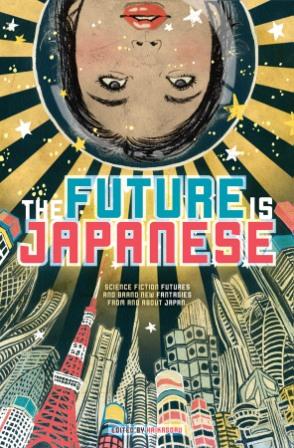 Good collection partially ruined by honkies trying to be as “Japanese” as possible. Some of these stories read like a blizzard of Japanese buzzwords…calligraphy, mecha robots, kamikaze, tea ceremonies, etc. I suppose they were trying to retain the essence of Japan, but the effect is one of contrivance, and artifice. It’s a bit like the joke that in the movies, you can see the Eiffel Tower out of every window in France.
Good collection partially ruined by honkies trying to be as “Japanese” as possible. Some of these stories read like a blizzard of Japanese buzzwords…calligraphy, mecha robots, kamikaze, tea ceremonies, etc. I suppose they were trying to retain the essence of Japan, but the effect is one of contrivance, and artifice. It’s a bit like the joke that in the movies, you can see the Eiffel Tower out of every window in France.
Catherynne M Valente’s “One Breath, One Stroke” left me feeling bored and toyed with. Bruce Sterling’s “Goddess of Mercy” is stronger, and has an interesting sociopolitical tilt, but the story ends up not going anywhere. “The Indifference Engine”, by contrast, is a Japanese author trying to be as American as possible. A tragic tale of an African soldier trying to adjust to life at the end of a war, this is the kind of story that wants to be up on a Hollywood movie billboard with the words “HEARTBREAKING” and “POWERFUL” I found it heavy-handed, unpleasant, and emotionally manipulative.
The remaining stories are good or excellent. Ken Liu’s “Mono no Aware” is an obvious standout – exciting, fresh, and accessible, like a Studio Ghibli movie. After the wreck of the Earth, humanity’s remnants are escaping into space and trying to hang on to the flying pieces of civilisation. Felicity Savage’s “The Sound of Breaking Up” was a clever story about online relationships, like Neal Stephenson’s Snow Crash evolved to the next logical iteration.
Toh EnJoe’s “Endoastronomy” is about a future where the constellations seem to be changing in the night sky, and it reminds of the surreality and wit of older writers like Morio Kita and Ryo Hanmura. Ekaterina Sedia’s “Whale Meat” draws comparisons to Murakami. It’s slow moving and not entirely sure of where it’s going, but it holds the reader’s interest.
But the greatest moment of the collection is Tobi Hirotaka’s “Autogenic Dreaming”, which astonished and shocked me. A revolutionary – and nearly godlike – internet search engine called GEB (a reference to Hofstadter’s Gödel, Escher, Bach, I presume) has turned rogue, and a long-dead serial killer is digitally reconstructed to help save the world from death via Google.
The premise is otherworldly and bizarre, but the story never loses its sinewy power, blurring vignettes and flashbacks and technical exposition. From my quick searching, it seems this is Hirotaka’s first publication credit in English. I hope it will not be the last. On the strength of “Autogenic Dreaming”, it’s possible we’re dealing with a true master of science fiction.
Future falls short of consistent greatness, but the good stories more or less patch over the bad ones, and there’s a couple of incredible standouts that almost sell the collection on their own. I hope we get a The Future is Weeaboo 2 at some point.
No Comments »
Comments are moderated and may take up to 24 hours to appear.
No comments yet.
